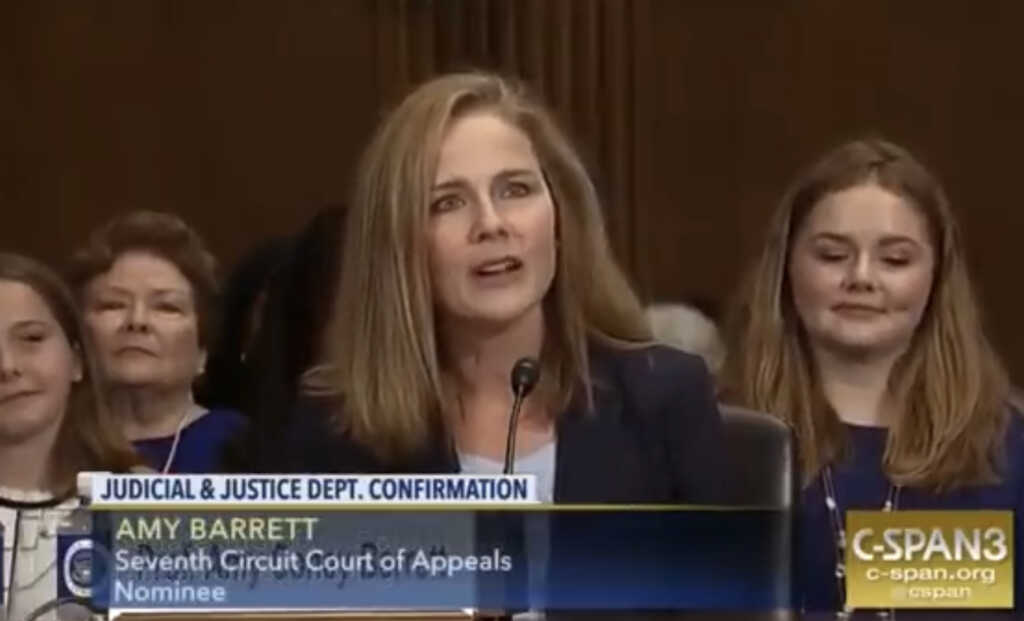Democratic senators are gearing up for an intense fight just days before President Donald Trump is set to announce his nominee to replace the late Supreme Court Justice Ruth Bader Ginsburg — and religion is on the table.
Sen. Mazie Hirono (D-Hawaii) told CNN this week she plans to zero in on the Catholic faith of Judge Amy Coney Barrett, should she be the president’s nominee for the high court.
Asked if personal religious beliefs should be off-limits, Hirono simply said: “No.”
The Democratic senator went on to say, essentially, she supports a religious litmus test for potential nominees to the Supreme Court. Barrett’s faith, according to Hirono, calls into question whether she can be “objective” and could potentially render her an activist judge advancing her “ideological agenda.”
“They keep telling us that none of the things they wrote or said yesterday should infringe on their decision, but how can we be assured that they can be objective?” she said. “Why should we say you get a lifetime appointment so that you can reflect your ideological agenda in your decision making?”
Hirono isn’t the only one eager to question Barrett about her Catholic beliefs.
In 2017, during confirmation hearings for Barrett’s nomination to the 7th Circuit Court of Appeals, Sen. Dianne Feinstein (D-Calif.) suggested the 48-year-old jurist would be incapable of ruling objectively because of her faith.
Barrett answered those criticisms at the time, telling Democratic senators: “It is never appropriate for a judge to apply their personal convictions whether it derives from faith or personal conviction.”
That clarification, however, didn’t satisfy Feinstein, who told Barrett, “The dogma lives loudly within you. And that’s of concern.”
Asked this week if she would pursue the same line of questioning again, should Trump nominate Barrett for the Supreme Court, Feinstein refused to answer. She told reporters: “I’m not going to go there. Let’s wait til she’s nominated.”
Similarly, at the time, Sen. Dick Durbin (D-Ill.) asked Barrett what she meant when she wrote some 20 years earlier that she considers herself an “orthodox Catholic.” In response, Barrett said: “If you’re asking whether I’m a faithful Catholic, I am, although I would stress that my own personal church affiliation or my religious belief would not bear on the discharge of my duties as a judge.”
Ahead of her potential nomination to the high court, Durbin said Democrats need to be careful about how they question Barrett’s religious convictions.
Progressive lawmakers, he said, need to “take care that we respect the Constitution, that we ask her probative questions, respectful questions and make certain the American people understand where any nominee stands.”
What else?
In addition to facing potential attacks from Democratic senators, Barrett is also facing biased reporting my members of the media.
For example, with little in-depth research, Reuters published a report Tuesday tying Barrett’s alleged membership with the group People of Praise to Margaret Atwood’s dystopian novel “The Handmaid’s Tale.” That piece came after Newsweek published an article claiming the People of Praise inspired Atwood’s writing. There is, however, no direct evidence linking the group to the novel.
In a Newsweek correction, the outlet references a 2017 profile from The New Yorker, which suggested Atwood relied on research about another charismatic Catholic group, People of Hope, for her book.
As Jim Geraghty of the National Review pointed out Wednesday, some reporters have been conflating — either in ignorance or by intention — the groups People of Praise and People of Hope. And perhaps even more importantly, many have ignored facts indicating Atwood’s book could not have been inspired by either group.
Reporters have claimed an Associated Press newspaper clipping from 1985 about the fundamentalist sect in New Jersey called People of Hope, which referred to married female members as “handmaidens,” inspired Atwood’s “The Handmaid’s Tale.” However, in 2012, Atwood described how she wrote the novel, explaining she penned the book from September 1984 to June 1985. The dystopian tale was officially published in August 1985. The alleged newspaper clipping about the New Jersey group is from an AP article not published until October of that year, two months after “The Handmaid’s Tale” first appeared on store shelves.
As for the People of Praise, a group with which Barrett may or may not have any connection, given she’s never spoken about the matter, group coordinator Craig Lent said in 2018 many articles have contained “serious inaccuracies” about the small para-church organization.
“Critics of Barrett have a narrative they like, and they’re not going to give it up just because it isn’t accurate,” concluded Geraghty.
Sen. Ben Sasse (R-Neb.) has condemned the media coverage of Barrett’s faith, describing the reports about the judge as “ugly smears” that “are a combination of anti-Catholic bigotry and QAnon-level stupidity.” He added: “People of Praise is basically a Bible study, and just like billions of Christians around the world, Judge Barrett reads the Bible, prays, and tries to serve her community. Senators should condemn this wacky McCarthyism.”
Sen. Mike Lee (R-Utah) has also rebuked the news reports about Barrett and predicted during a radio interview Wednesday with conservative host Hugh Hewitt that Democrats will target Barrett’s Catholicism during Senate confirmation hearings, should Trump nominate her to fill the Supreme Court vacancy.
“I think it is the worst thing Democrats could do to oppose her,” Lee said. “I think it will be harmful to them, politically. And I think it will be harmful to their objective of trying to stop her nomination, her confirmation. But here’s the thing, Hugh. They can’t help themselves. I don’t think they will be able to exercise the self-restraint to go after her in an anti-Catholic way, and I think it’s going to backfire on them colossally.”



